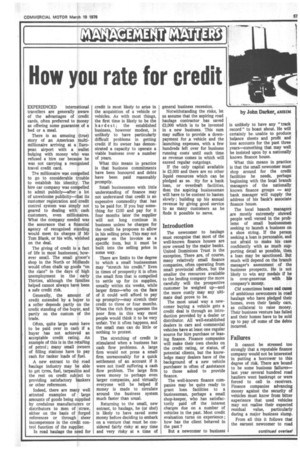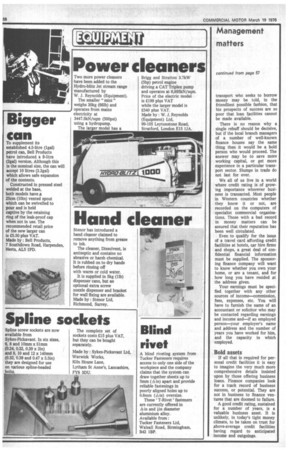How you rate for credit
Page 59

Page 60

If you've noticed an error in this article please click here to report it so we can fix it.
EXPERIENCED international travellers are generally aware of the advantages of credit cards, often preferred to money as offering some guarantee of a bed or a meal.
There is an amusing (true) story of An American multimillionaire arriving at a European airport with a wallet bulging with money who was refused a hire car because he was not carrying a recognised travel credit card.
The millionaire was compelled to go to considerable trouble to establish his identity. The hire car company was compelled to admit publicly—after a lot of unwelcome publicity—that its customer registration and credit control system was simply not geared to dealing with cash customers, even millionaires. What the company needed was the assurance that a financial agency of recognised standing would meet its charges if Mr Tom Blank, or his wife, welshed on the deal.
Generally, the amount of credit extended by a buyer to a seller depends partly on the credit standing of the buyer, and partly on the custom of the trade. The giving of credit is a fact of life in most businesses, however small. The small grocer's shop in the North or Midlands would often chalk up goods "on the slate" in the days of high unemployment in the early Thirties, although the families helped cannot always have been a safe credit risk.
Often, quite large sums have to be paid over in cash if a buyer has not achieved an acceptable credit rating. An example of this is in the retailing of petrol ; many small owners of filling stations have to pay cash for tanker loads of fuel.
A new entrant to th road haulage industry may • able to get tyres, fuel, tarpau ns and the rest on credit sub ect to providing satisfactory $, ers or other references.
Indeed, there are m y well attested examples of large amounts of goods being s pplied by credulous manufactu rs or distributors to men of straw, either on the basis of forged references or through sheer incompetence in the cre 't control function of the sup. her.
In road haulage the n ed for credit is most likely to arise in the acquisition of a vehicle or vehicles. As with most things, the first time is likely to be the hardest; the established business, however modest, is unlikely to have particularly difficult problems in getting credit if its owner has demonstrated a capacity to operate a viable business over a number of years.
What this means in practice is that business commitments have been honoured and debts have been paid reasonably promptly.
Small businessmen with little understanding of finance may not understand that credit is an expensive commodity that has to be paid for. If you buy something for E100 and pay for it four months later the supplier will not long continue in business unless he charges for the credit he proposes to allow in his selling price. This may not Appear on the invoice as a specific item, but it must be built into the selling price in some way.
There are limits to the degree to which a small businessman may "stretch his credit." Even in times of prosperity it is often the small firm that is compelled to settle up for its supplies, usually within six weeks, while larger firms—who on the face of it could well afford to pay up promptly—may stretch their credit to three or four months. When the rich firm squeezes the poor firm in this way most people would think it to be very unfair. Yet it often happens, and the small man can do little or nothing to protest.
The stretching of credit is stimulated when a business has cash flow problems. A large firm would not press a small firm unreasonably for a quick settlement of an account if it were not itself suffering a cash flow problem. The large firm owes money to perhaps even larger companies, And virtually everyone will be helped if money is made to circulate around the business system much faster than usual.
Returning to the small, new entrant, to haulage, he (or she!) is likely to have saved some money before deciding to embark on a venture that must be considered fairly risky at any time and very risky at a time of general business recession.
Notwithstanding the risks, let us assume that the aspiring road haulage contractor has saved £2,000 which is to be invested in a new business. This sum may suffice to provide a downpayment for A vehicle and the launching expenses, with a few hundreds left , over for business running costs until such time as revenue comes in which will exceed regular outgoings.
If the only capital available is £2,000 and there are no other liquid resources which can be pledged as set ity for a bank loan, or overdraft facilities, then the aspiring businessman will have to be content to hasten slowly ; building up his annual revenue by giving good service to as many customers as he finds it possible to serve.
Introduction
The newcomer to haulage must recognise that most of the well-known finance houses are now owned by the major banks. United Dominions Trust is the exception. There Are, of course, many relatively small finance companies, often operating from small provincial offices, but the smaller the resources available to the lending company the more carefully will the prospective customer be weighed up—and the more costly may any ultimate deal prove to be.
The most usual way a newcomer buying a vehicle gets a credit deal is through an introduction provided by a dealer or distributor. All well-established dealers in cars and commercial vehicles -have at least one regular source for hire purchase or leasing finance. Finance companies will make their own checks on the credit rating, or status, of potential clients, but the knowledge many dealers have of the background of a new vehicle purchaser is often of Assistance to those asked to provide finance.
The well-known finance companies may be quite ready to grant loan facilities to a businessman, perhaps a small shop-keeper, who has satisfactorily paid off the interest charges due on a number of vehicles in the past. Most credit evaluation turns on experience ; how has the client behaved in the past ?
But a newcomer to business is unlikely to have any "track record" to boast about. He will certainly be unable to produce balance sheets and profit and loss accounts for the past three years—something that may well be insisted upon by a nationally known finance house.
What this means in practice is that the small newcomer must shop around for the credit facilities he needs, perhaps beginning with the local branch managers of the nationally known finance groups — any bank manager will supply the address of his bank's associate finance house.
The local branch managers Are mostly extremely shrewd people well versed in the problems of small businessmen seeking to launch a business on a shoe string. If the person seeking a loan is personable, and not afraid to make his case confidently with as much supporting detail as possible, then. a loan may be sanctioned. But much will depend on the branch manager's assessment of the business prospects. He is not likely to win any medals if he is over-generous with his company's money.
CM sometimes hears sad cases of ambitious newcomers in road haulage who have pledged their homes, even their family cars, as collateral to raise money. Their business venture has failed and their homes have to be sold up to pay off some of the debts Incurred.
Failures
It cannot be stressed too strongly that a reputable finance company would not be interested In putting a borrower to this degree of risk. There are bound to be some business failures— last year several hundred road hauliers went bankrupt or were forced to call in receivers. Finance companies advancing money against the security of vehicles must know from bitter experience that used vehicles may not realise their expected residual value, particularly during a major business slump.
From all this it follows that the earnest newcomer to road transport who seeks to borrow money may be told, in the friendliest possible fashion, that his prospects of success are so poor that loan facilities cannot be made available.
There is no reason why a single rebuff should be decisive, but if the local branch managers of a number of well-known finance houses say the same thing then it would be a bold person who would proceed. The answer may be to save more working capital, or get more experience in a particular transport sector. Slumps in trade do not last for ever.
We all of us live in a world where credit rating is of growing importance wherever business is transacted. Most people in Western countries whether they know it or not, are recorded on the computers of specialist commercial organisations. Those with a bad record in money matters can be assured that their reputation has been well circulated.
Even to qualify for the issue of a travel card affording credit facilities at hotels, car hire firms and shops, a great deal of confidential financial information must be supplied. The sponsoring finance company will want to know whether you own your home, or are a tenant, and for how long you have resided at the address given.
Your earnings must be specified. together with any other sources of income—commission, fees, expenses, etc. You will have to furnish the name of an accountant or solicitor who may be contacted regarding earnings and income and—if an employed person—your employer's name and address and the number of years you have worked for him, and the capacity in which employed.
Bold assets
If all that is required for personal credit facilities it is easy to imagine the very much more comprehensive details insisted upon by those offering business loans. Finance companies look for a track record of business success, or potential. They are not in business to finance ventures that are doomed to failure.
A good credit rating, sustained for a number of years, is a valuable business asset. It is unlikely, in today's tight money climate, to be taken on trust for above-average credit facilities having regard to anticipated income and outgoings.








































































































